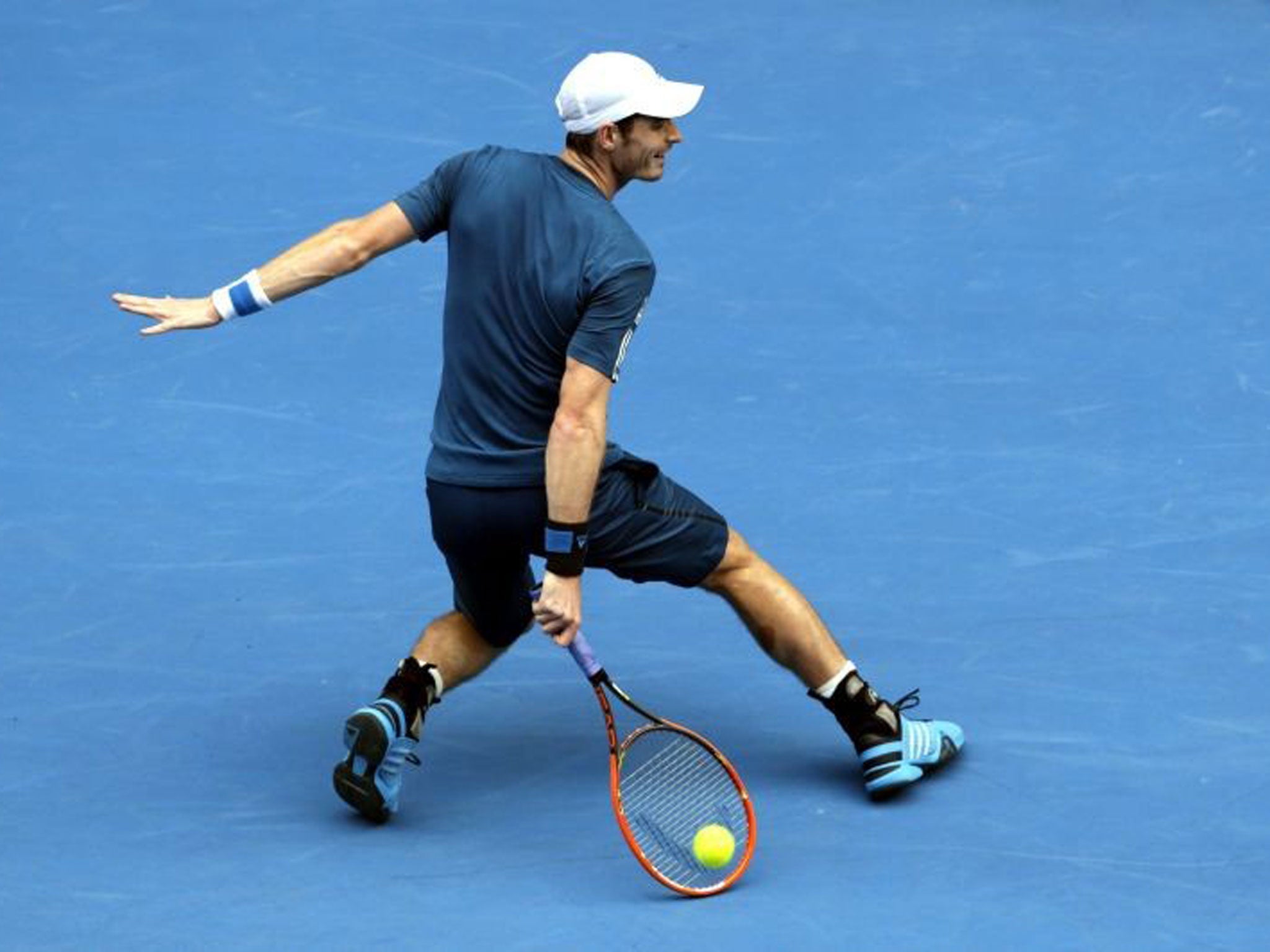Australian Open 2014: Dostoyevsky fan Stéphane Robert books tie with Andy Murray
On his day, he can be as cultured on court as he is off it so Briton needs to beware

There are not many professional tennis players whose name would feature alongside the words “backpacker”, “youth hostel”, “casino”, “Dostoyevsky” and “sophrology” in the same paragraph, but then again there are not many individuals like Stéphane Robert. The 33-year-old Frenchman, who stands between Andy Murray and a place in the quarter-finals of the Australian Open, is one of the game’s characters.
Whether a player who took just four games off Britain’s James Ward three weeks ago in the Brisbane qualifying tournament can threaten Murray is another matter. Murray booked his place in the last 16 with an emphatic 7-6 6-4 6-2 victory over Feliciano Lopez, while Robert, the world No 119, went further into a Grand Slam tournament than he has ever gone before by beating Slovakia’s Martin Klizan 6-0 7-6 6-4.
Like Klizan, Robert was a “lucky loser” who lost in the last round of qualifying but was handed a place in the main draw after a withdrawal. Robert was told he was playing, courtesy of Philipp Kohlschreiber’s injury, just 10 minutes before he went out to play Slovenia’s Aljaz Bedene. When Robert lost in qualifying here last year he went back-packing around Australia, playing in Challenger tournaments and staying in youth hostels.
His 2013 itinerary included tournaments in Noumea (New Caledonia), Burnie (Australia), Mersin (Turkey), Ostrava (Czech Republic), Portoroz (Slovenia), Poznan (Poland), Trnava (Slovakia) and Tashkent (Uzbekistan).
Robert won £98,200 last year. By reaching the fourth round here he has already secured £72,200 in prize money. He has earned £560,000 in his career compared with Murray’s £18.5 million. In the past Robert has supplemented his earnings with trips to the casino, which he visited last week, spotting Lopez and Rafael Nadal while he was there.
He is “a little bit up” in terms of profit but is not planning a return visit. “I don’t go there trying to earn money,” he said. “If you go to earn money, you lose money.”
Robert realised his only major tennis ambition by beating Tomas Berdych at the French Open three years ago. “The only major goal I had in tennis was to go on a run at Roland Garros,” he said. “As Thierry Roland [the celebrated French TV commentator] said after France won the World Cup, ‘I can die happy.’
“It’s the same thing for me. I realised my ambition. OK, it wasn’t the greatest performance of the century, but I did my thing.”
An avid reader who likes Russian authors (“Dostoyevsky, Nabokov, Tolstoy”) and Le Monde, Robert practises sophrology which, according to the Sophrology Academy, is “the science of the consciousness in harmony” and “a life-balancing technique made of very practical physical and mental exercises aiming at an alert mind in a relaxed body”.
Asked what sophrology he had used before his victory yesterday, Robert said: “In the morning I did yoga breathing. I do that to try to find inner calm. I did that at the hotel and on the court. It helps my concentration. On the court I try to make myself aware of everything. For example, I bounce the ball on my racket for a minute so that I can concentrate on the noise.”
Murray, who remembers Robert (below) from his own days coming up through the Challenger ranks, was pleased with his form against Lopez, who has now lost all eight of their meetings. “Today was a big step up for me,” Murray said. “Feliciano is a top-30 player. He’s a tricky opponent.”
He added: “My expectations are still fairly low just now. I’m not expecting too much of myself, but obviously with each round that goes by I’m starting to feel more comfortable on the court and the body is going to adjust to playing matches again. I don’t know how far I can go, but I’m doing OK so far.”
Asked if he had been to the casino, Murray said he had made two visits, but only before the start of the tournament. “A lot of the players go to the casino,” he said.
“A lot of the Americans used to go to the casino during the event. I think when Marcelo Rios played here there were rumours going around that he would have needed to make the final to break even. A lot of players go there, but not me during the tournament.”
Murray’s brother, Jamie, and his Australian partner, John Peers, also went out of the tournament, beaten 6-4 6-4 by Eric Butorac and Raven Klaasen. After the match Jamie gave further insight into his frightening experience 48 hours earlier when he suffered heat exhaustion after playing in temperatures of more than 42C. “I started feeling bad when I got back to the changing rooms,” he said. “I was really light-headed. I just wanted to lie down. Then I started to cramp in my legs.”
Jamie thought his problems had been a result of not eating or drinking properly before the match after oversleeping because his wake-up alarm failed to go off. Asked whether he was as meticulous as his brother in his pre-match preparations, Jamie said: “He’s got the finances to be able to do that. A lot of us don’t have five or six guys following us and watching our every move.”
Andy suggested his brother’s problem was that he relied on the alarm on his phone. “He almost messed up his whole Australian Open,” Andy said. “He will learn from that and will probably never do it again. You should always get someone to call the room. But he was fairly lucky and woke up in time. They actually woke him up. They called him because his car was there.”
Join our commenting forum
Join thought-provoking conversations, follow other Independent readers and see their replies
Comments
Bookmark popover
Removed from bookmarks